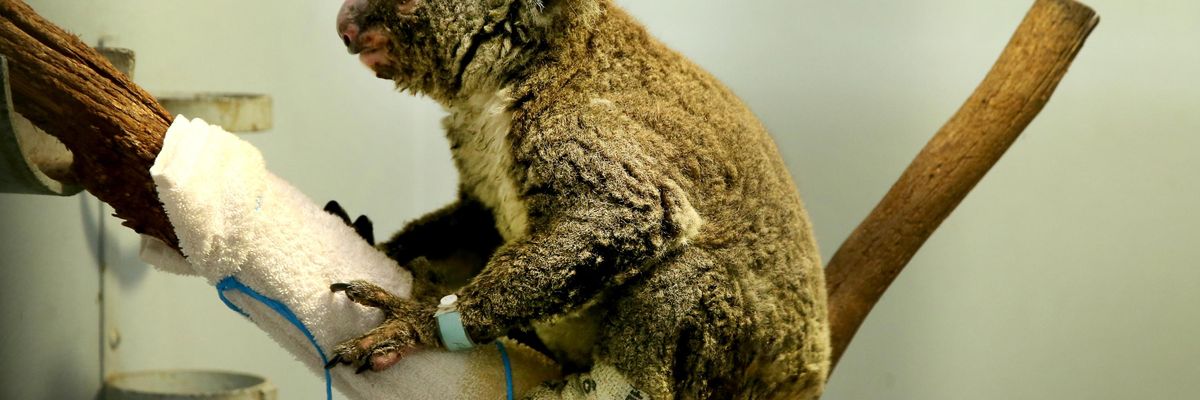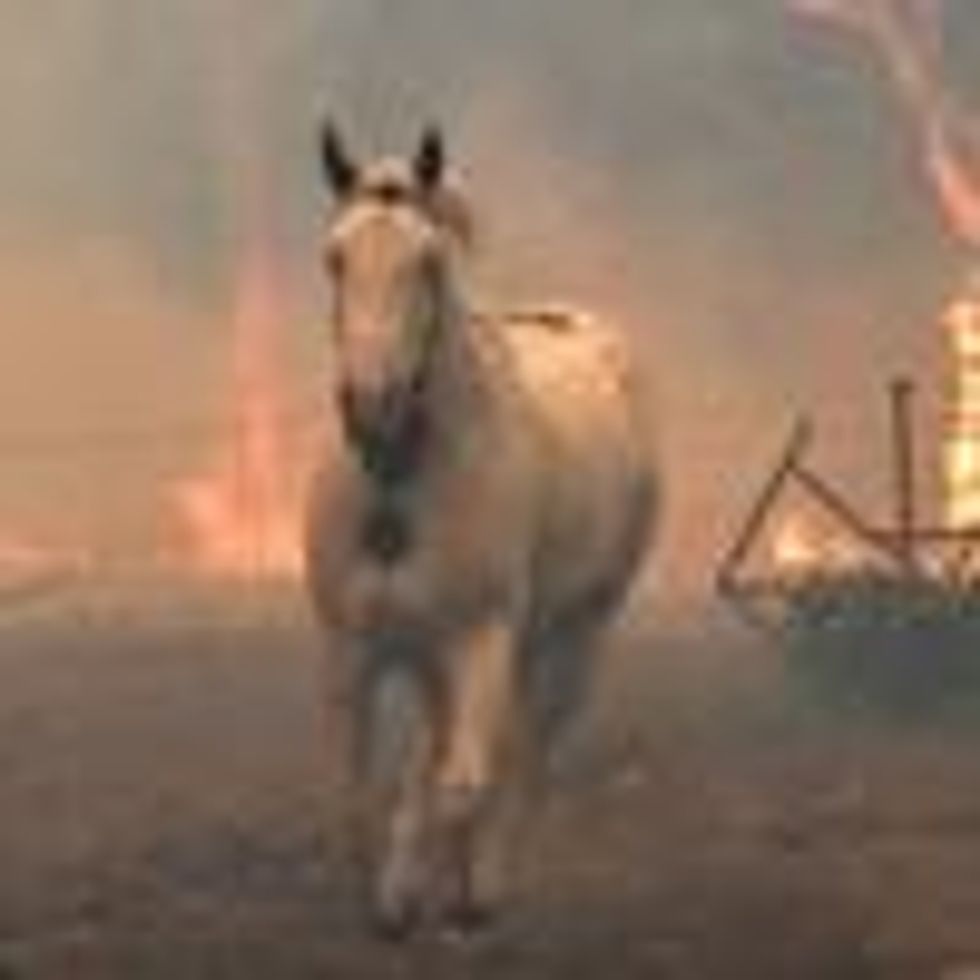

SUBSCRIBE TO OUR FREE NEWSLETTER
Daily news & progressive opinion—funded by the people, not the corporations—delivered straight to your inbox.
5
#000000
#FFFFFF
To donate by check, phone, or other method, see our More Ways to Give page.


Daily news & progressive opinion—funded by the people, not the corporations—delivered straight to your inbox.

A koala recovers from burns at a hospital in Port Macquarie, Australia on November 29, 2019. (Photo: Nathan Edwards/Getty Images)
A sweeping, multiyear assessment of the Australian environment published Tuesday warns that the continent's biodiversity is declining at an alarming rate as the climate crisis intensifies, wreaking havoc through rapidly warming temperatures, more frequent and damaging extreme weather events, and ocean acidification.
The report was originally turned over to the fossil fuel-friendly government of former Australian Prime Minister Scott Morrison back in December 2021. But the right-wing government opted not to release it ahead of the 2022 elections in May, when voters swept Morrison from power in favor of the Labor Party.
"In order to give our reefs a fighting chance at survival, we need rapid, deep cuts to emissions and no new fossil fuel projects."
Morrison's government was accused of deliberately suppressing the report to hide its damning conclusions about the state of Australia's environment after years of conservative leadership.
"The state and trend of the environment of Australia are poor and deteriorating as a result of increasing pressures from climate change, habitat loss, invasive species, pollution, and resource extraction," states the report, which notes that "over the past two centuries, Australia has lost more mammal species than any other continent and continues to have one of the highest rates of species decline" among wealthy nations.
Overall, the report finds that "more than 1,900 Australian species and ecological communities are known to be threatened or at risk of extinction," part of a worsening global biodiversity crisis accelerated by the climate emergency.
Tanya Plibersek, Australia's environment minister, said Tuesday that the new report "is a shocking document--it tells a story of crisis and decline in Australia's environment, and of a decade of government inaction and willful ignorance."
"I won't be putting my head in the sand," Plibersek said. "Under Labor, the environment is back on the priority list."
Plibersek noted that the catastrophic bushfires of 2019 and 2020 "were an ecological bomb ripping through southeastern Australia." Koalas are now considered endangered in parts of Australia after they and other species were devastated by the blazes.
In an op-ed Tuesday, the report's lead authors observed that "seasonal fire periods are becoming longer" and "extreme events are also affecting ecosystems in ways never before documented."
"For example," they wrote, "the downstream effects of the 2019-2020 bushfires introduced a range of contaminants to coastal estuaries, in the first global record of bushfires impacting estuarine habitat quality."
Related Content

The new report confirms that the Great Barrier Reef, one of the world's most diverse ecosystems, is badly suffering amid warming ocean temperatures, which are fueling damaging mass bleaching events.
"Coral reefs are expected to continue to decline with further global warming," the assessment warns. "Projections reported by the Intergovernmental Panel on Climate Change indicate that coral reefs are expected to decline globally by a further 70-90% (relative to 2015) at 1.5degC global warming, and by more than 99% at 2degC global warming."
David Ritter, the CEO of Greenpeace Australia Pacific, said in a statement Tuesday that "in order to give our reefs a fighting chance at survival, we need rapid, deep cuts to emissions and no new fossil fuel projects."
"This report is the consequence of years of perverse political decision-making that has put the vested interests of polluting corporations and environmental vandals ahead of the best interests of the Australian people and our magnificent natural environment," said Ritter. "The state of Australia's environment demands urgent and decisive emissions reduction, an end to new fossil fuel extraction, and rapid acceleration of the shift to cleaner, cheaper renewable energy."
Trump and Musk are on an unconstitutional rampage, aiming for virtually every corner of the federal government. These two right-wing billionaires are targeting nurses, scientists, teachers, daycare providers, judges, veterans, air traffic controllers, and nuclear safety inspectors. No one is safe. The food stamps program, Social Security, Medicare, and Medicaid are next. It’s an unprecedented disaster and a five-alarm fire, but there will be a reckoning. The people did not vote for this. The American people do not want this dystopian hellscape that hides behind claims of “efficiency.” Still, in reality, it is all a giveaway to corporate interests and the libertarian dreams of far-right oligarchs like Musk. Common Dreams is playing a vital role by reporting day and night on this orgy of corruption and greed, as well as what everyday people can do to organize and fight back. As a people-powered nonprofit news outlet, we cover issues the corporate media never will, but we can only continue with our readers’ support. |
A sweeping, multiyear assessment of the Australian environment published Tuesday warns that the continent's biodiversity is declining at an alarming rate as the climate crisis intensifies, wreaking havoc through rapidly warming temperatures, more frequent and damaging extreme weather events, and ocean acidification.
The report was originally turned over to the fossil fuel-friendly government of former Australian Prime Minister Scott Morrison back in December 2021. But the right-wing government opted not to release it ahead of the 2022 elections in May, when voters swept Morrison from power in favor of the Labor Party.
"In order to give our reefs a fighting chance at survival, we need rapid, deep cuts to emissions and no new fossil fuel projects."
Morrison's government was accused of deliberately suppressing the report to hide its damning conclusions about the state of Australia's environment after years of conservative leadership.
"The state and trend of the environment of Australia are poor and deteriorating as a result of increasing pressures from climate change, habitat loss, invasive species, pollution, and resource extraction," states the report, which notes that "over the past two centuries, Australia has lost more mammal species than any other continent and continues to have one of the highest rates of species decline" among wealthy nations.
Overall, the report finds that "more than 1,900 Australian species and ecological communities are known to be threatened or at risk of extinction," part of a worsening global biodiversity crisis accelerated by the climate emergency.
Tanya Plibersek, Australia's environment minister, said Tuesday that the new report "is a shocking document--it tells a story of crisis and decline in Australia's environment, and of a decade of government inaction and willful ignorance."
"I won't be putting my head in the sand," Plibersek said. "Under Labor, the environment is back on the priority list."
Plibersek noted that the catastrophic bushfires of 2019 and 2020 "were an ecological bomb ripping through southeastern Australia." Koalas are now considered endangered in parts of Australia after they and other species were devastated by the blazes.
In an op-ed Tuesday, the report's lead authors observed that "seasonal fire periods are becoming longer" and "extreme events are also affecting ecosystems in ways never before documented."
"For example," they wrote, "the downstream effects of the 2019-2020 bushfires introduced a range of contaminants to coastal estuaries, in the first global record of bushfires impacting estuarine habitat quality."
Related Content

The new report confirms that the Great Barrier Reef, one of the world's most diverse ecosystems, is badly suffering amid warming ocean temperatures, which are fueling damaging mass bleaching events.
"Coral reefs are expected to continue to decline with further global warming," the assessment warns. "Projections reported by the Intergovernmental Panel on Climate Change indicate that coral reefs are expected to decline globally by a further 70-90% (relative to 2015) at 1.5degC global warming, and by more than 99% at 2degC global warming."
David Ritter, the CEO of Greenpeace Australia Pacific, said in a statement Tuesday that "in order to give our reefs a fighting chance at survival, we need rapid, deep cuts to emissions and no new fossil fuel projects."
"This report is the consequence of years of perverse political decision-making that has put the vested interests of polluting corporations and environmental vandals ahead of the best interests of the Australian people and our magnificent natural environment," said Ritter. "The state of Australia's environment demands urgent and decisive emissions reduction, an end to new fossil fuel extraction, and rapid acceleration of the shift to cleaner, cheaper renewable energy."
A sweeping, multiyear assessment of the Australian environment published Tuesday warns that the continent's biodiversity is declining at an alarming rate as the climate crisis intensifies, wreaking havoc through rapidly warming temperatures, more frequent and damaging extreme weather events, and ocean acidification.
The report was originally turned over to the fossil fuel-friendly government of former Australian Prime Minister Scott Morrison back in December 2021. But the right-wing government opted not to release it ahead of the 2022 elections in May, when voters swept Morrison from power in favor of the Labor Party.
"In order to give our reefs a fighting chance at survival, we need rapid, deep cuts to emissions and no new fossil fuel projects."
Morrison's government was accused of deliberately suppressing the report to hide its damning conclusions about the state of Australia's environment after years of conservative leadership.
"The state and trend of the environment of Australia are poor and deteriorating as a result of increasing pressures from climate change, habitat loss, invasive species, pollution, and resource extraction," states the report, which notes that "over the past two centuries, Australia has lost more mammal species than any other continent and continues to have one of the highest rates of species decline" among wealthy nations.
Overall, the report finds that "more than 1,900 Australian species and ecological communities are known to be threatened or at risk of extinction," part of a worsening global biodiversity crisis accelerated by the climate emergency.
Tanya Plibersek, Australia's environment minister, said Tuesday that the new report "is a shocking document--it tells a story of crisis and decline in Australia's environment, and of a decade of government inaction and willful ignorance."
"I won't be putting my head in the sand," Plibersek said. "Under Labor, the environment is back on the priority list."
Plibersek noted that the catastrophic bushfires of 2019 and 2020 "were an ecological bomb ripping through southeastern Australia." Koalas are now considered endangered in parts of Australia after they and other species were devastated by the blazes.
In an op-ed Tuesday, the report's lead authors observed that "seasonal fire periods are becoming longer" and "extreme events are also affecting ecosystems in ways never before documented."
"For example," they wrote, "the downstream effects of the 2019-2020 bushfires introduced a range of contaminants to coastal estuaries, in the first global record of bushfires impacting estuarine habitat quality."
Related Content

The new report confirms that the Great Barrier Reef, one of the world's most diverse ecosystems, is badly suffering amid warming ocean temperatures, which are fueling damaging mass bleaching events.
"Coral reefs are expected to continue to decline with further global warming," the assessment warns. "Projections reported by the Intergovernmental Panel on Climate Change indicate that coral reefs are expected to decline globally by a further 70-90% (relative to 2015) at 1.5degC global warming, and by more than 99% at 2degC global warming."
David Ritter, the CEO of Greenpeace Australia Pacific, said in a statement Tuesday that "in order to give our reefs a fighting chance at survival, we need rapid, deep cuts to emissions and no new fossil fuel projects."
"This report is the consequence of years of perverse political decision-making that has put the vested interests of polluting corporations and environmental vandals ahead of the best interests of the Australian people and our magnificent natural environment," said Ritter. "The state of Australia's environment demands urgent and decisive emissions reduction, an end to new fossil fuel extraction, and rapid acceleration of the shift to cleaner, cheaper renewable energy."